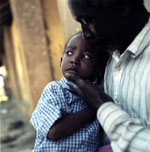Untitled Document
The world's richest nations greatly exaggerate their aid to poor countries –
with the US, the worst offender, giving only 0.02% of its income in real assistance,
says a study released today by ActionAid International. 
The report, which can be downloaded at http://www.actionaidusa.org/Action
Aid Real Aid.pdf says that some two-thirds of the money donated by the world’s
wealthiest countries is in actuality “phantom aid” that is not genuinely
available for poverty reduction in developing countries.
Phantom Aid is aid that is diverted from poor nations for other purposes within
bureaucratic aid systems. This includes aid that is, among all G7 donations:
- not targeted for poverty reduction, estimated to be worth US$4.9 billion
double counted as debt relief, totaling US$9.4 billion
- overpriced and ineffective- Technical Assistance, estimated at US$13.8
billion
- tied to goods and services from the donor country, estimated at US$2.7
billion
- poorly coordinated and with high transaction costs, estimated at US$9 billion
- too unpredictable to be useful to the recipient – lack of data prevents
an estimate
- spent on immigration-related costs in the donor country; totaling US$1.5
billion
- spent on excess administration costs; totaling US$0.4 billion.
In total, says the study, at least 61% of all donor assistance from G7
nations is phantom aid, with real aid in 2003 accounting for just US$27 billion,
or only 0.1% of combined donor income. Nearly 90% of all contributions coming
from the United States and France are considered phantom aid.
Says ActionAid International USA Policy Analyst, Rick Rowden, “what this
comes down to is that the US government is spending the tax dollars of well
meaning Americans on bloated, inefficient, and manipulative programs that do
little to help the poor. This is inexcusable when you consider that a child
dies every two seconds from hunger somewhere in the world.”
The report argues that the share of real aid is unlikely to increase unless
a system of genuine accountability, which balances the interests of donors,
recipients, and the poor, can be put in place.
In addition, the report calls for a new International Aid Agreement that will
hold donor countries accountable. This Agreement should include clear policies
from developing countries on the criteria for accepting aid; mutual commitments
from donor and recipient countries; national and international review forums;
and new mechanisms for increasing the amount and predictability of aid to the
world’s poorest countries.
Every day, 800 million people go to bed hungry, 30,000 children die
of preventable disease, 100 million children are denied education. Three children
a minute die due to unsafe water and sanitation. Approximately 30 children die
a minute of hunger.
NOTES TO EDITORS
ActionAid International is a nonprofit organization bringing relief to some
13 million people in Africa, Asia, Latin America, and the Caribbean every year.
Working hand-in-hand with 2,000 civil society partners, 90% of ActionAid's employees
herald from developing countries.

